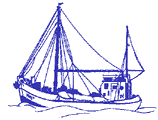The Ok Tedi Pagesby Foerderkreis "Rettet die Elbe" (Save the Elbe)down"The best years are yet to come!" said the mining engineer. Ok Tedi Mine starts its final ten years with bright economic expectations: highest ore concentrations, a well trained staff, proof equipment, and the credits paid. To the environment, it could be the worst ten years. 200,000 tons of problems from dead rock and tailings will be added to Ok Tedi River each day. The measures taken by the company, Ok Tedi Mining Limited (OTML), do not heal the wounds of the past, nor do they seriously attempt to prevent the damage of the future. The social programs, to develop business and trade that will sustain after mine closure in ten years, have started late. It remains an open question, if residents of the Ok Tedi area will adopt them, and if a post-mine economy will yield income of even half of the present level. An immediate closure of the mine, however, would be the worst solution to people, who depend on the mine. It would stop any rehabilitation project, and even environmentalist groups and other opponents of the mine do not demand mine closure as a precondition unanimously. Of greatest concern are rumours, that the Australian based dominant shareholder of OTML, namely Broken Hill Propietary (BHP), may sell its share to quitresponsibility. This report will cover the findings of a travel to Ok Tedi Mine at Papua New Guinea of a delegation from Hamburg, Germany, and an assessment by the environmentalist group "Save the Elbe". The travel was started after a "critical shareholder action" at the annual convention of Hamburg's coppersmelter "Norddeutsche Affinerie". "Norddeutsche Affinerie" (NA), Hamburg, Germany, is the leading coppersmelter in Europe, which is the largest market for copper in the world. NA does not own mines, but buys ore concentrate from mines abroad. Since the beginning of copper mining at Ok Tedi, NA is an important customer, which at present receives approximately 20% of Ok Tedi mine's production. In relation to NA's primary production, this means a 15% share. Two decades ago NA was severely critizised to pollute Hamburg and the river Elbe with toxic metals and arsenic. NA had to refurbish its utilities, and applied better cleaning techniques. Today NA boasts to be the most environmental friendly copper smelter of the world. There is some doubt allowed on this. The dominant environmental damage today will occur at mines like Ok Tedi.This, however, is detrimental for NA's public relations strategy, which promotes copper as a clean and sustainable product. At the shareholder meeting on April 2000, the environmentalist group "Rettet die Elbe" = "Save the Elbe" proposed:
The NA-delegation to PNG was formed by member of the executive board, Dr. Michael Landau, the environmental manager Dr. Hans-Joachim Velten, and the head of the workers council Mr. Hans Grundmann. They were accompanied by Dr. Klaus Baumgardt, member of "Save the Elbe", Dr. Klaus Schilder and Dr. Volker Boege, both member of "German Pacific Network". Monday, 6 November, noon, to Wednesday, 8 Nov., morning, visit to Ok Tedi mine, Tabubil, as guests of OTMLup The following pages report the actions of "Save the Elbe" at Hamburg, and the results of the travel to PNGOriginal issue April 2001last update August 2003 Note that links to videoclips and map-packages are only valid in the CD-ROM version of Ok Tedi pages. On the internet, these files are too bulky.
Foerderkreis "Rettet die Elbe"
"Save the Elbe" is not sponsored by any company, state, or political party. Members of "Save the Elbe" work on a voluntary base. The only benefit it receives from NA is the dividend of 1 share (valued 10 US$), that serves as a ticket, to get into the shareholder's rights. However, we accepted the invitation of OTML to get from Port Moresby to Tabubil, and be hosted at OTML's guest house, because no other possibility was available, to visit this very remote place.  Homepage
"Save the Elbe" Homepage
"Save the Elbe" |